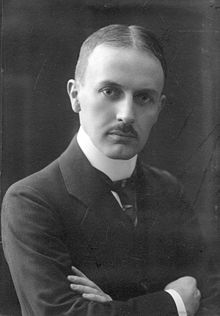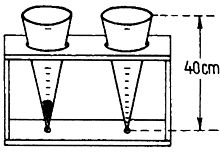Karl Imhoff

Karl Ludwig Imhoff (born April 7, 1876 in Mannheim , † September 28, 1965 in Essen ) was a German civil engineer and a pioneer of wastewater technology , which he shaped for decades.
Live and act
Karl Imhoff studied at the Technical University of Munich and the Technical University of Karlsruhe , whereupon he graduated in 1900. At first he worked as a government construction trainee in the Baden state service. After he had passed the Great State Examination, he worked at the Royal Prussian Research and Testing Institute for Water Supply and Sewage Disposal in Berlin . In 1905 he received his doctorate on the subject of biological wastewater treatment in Germany at the Technical University of Dresden .
Karl Imhoff was the driving force behind the technical development of the process for wastewater treatment invented in England (the trickling filter and the activated sludge process ). He owes not only significant technical innovations to him, but also dimensioning rules that were gained from experience in the operation of sewage treatment plants and that he recorded in his pocket book on Stadtentwässerung from 1906, which continues to appear in new editions to this day. In its 100-year history, the book has been translated 40 times. It has appeared in a total of 20 languages.
From April 1, 1906, Imhoff worked for the Emschergenossenschaft as head of the sewage office. In 1907 he developed the Emscherbrunnen there with an anaerobic sludge treatment, also known internationally as the Imhoff tank . While at the Emschergenossenschaft he wrote in 1910 a report entitled The pollution of the Ruhr (1912 published as a book), the basis for the 1913 adopted Ruhr pollution control law was, and establishing the Ruhrverband led. In doing so, he was able to rely on Heinrich Reisner's hydrological research on the Ruhr and on water management in the Ruhr area .
In 1911 Imhoff was also deputy building director and in 1913, after the Ruhr Association was founded, its part-time managing director. On January 1, 1922, Imhoff became the full-time managing director of the Ruhr Association. Five Ruhr reservoirs were planned under his leadership . During this time, Imhoff lived in a house that was completed in 1928 in Essen's Moltkeviertel on Robert-Schmidt-Straße, designed by the architect Alfred Fischer according to the principles of New Building .
In 1934 Imhoff was deposed as managing director of the Ruhrverband by the National Socialists . On May 10, 1948, the Abwassertechnische Vereinigung eV (ATV, later DWA) was founded in Düsseldorf on his initiative and on the initiative of the director of the Ruhr Association, Max Prüss . At that time Imhoff was the most important capacity for wastewater technology in Germany.
Honors
Imhoff was awarded honorary doctorates from the technical universities of Karlsruhe, Stuttgart and Aachen . He became honorary chairman of the Abwassertechnischen Vereinigung (ATV, later DWA), honorary president of the Association of German Water Protection, honorary president of the special purpose association for sewerage promotion and an honorary member of numerous foreign specialist organizations.
In 1953 he received the Great Cross of Merit of the Federal Republic of Germany and in 1959 the Bunsen-Pettenkofer Honor Roll . This is awarded by the DVGW to people who have made an outstanding contribution to the promotion of water and wastewater management in a scientific or practical manner. It was donated on June 12, 1900 in Mainz.
The Karl Imhoff Prize , endowed with 10,000 euros, was donated in recognition of Karl Imhoff's great services to the German wastewater industry and as a lasting reminder of his work. It is awarded by the German Association for Water Management, Wastewater and Waste eV (DWA) to promote scientific work in the field of wastewater management for excellent research, dissertations or examination papers.
In wastewater management, Imhoff basins , which are used to treat wastewater, and the Imhoff glass for determining the substances that can be deposited are known.
In Essen , Hannover , Langenhagen , Mannheim , Schleswig and Straubing streets were named after him.
Fonts (selection)
-
Urban drainage pocket book. Verlag R. Oldenbourg, Munich 1906.
- 30th edition (for the 100th anniversary of the first edition), Oldenbourg Industrieverlag, Munich 2006, ISBN 3-8356-3094-6 .
- English-language edition: Karl Imhoff's Handbook of Urban Drainage and Wastewater Disposal. Wiley, New York 1989, ISBN 0-471-81037-1 .
- (with GM Fair): Sewage treatment. John Wiley & Sons, New York 1949.
- (with WJ Müller, DKB Thistlethwayte): Disposal of Sewage and other Water-borne Wastes. 2nd Edn, Butterworths, London 1971.
Individual evidence
- ↑ Site plan on Wikimedia Commons
- ↑ Hanns Roediger, Markus Roediger, Helmut Kapp: Anaerobic alkaline sludge digestion . 4th edition. Oldenbourg, Munich 1990, ISBN 3-8356-6103-5 .
- ^ Karl Imhoff: Keeping the Ruhr pure . Edited on behalf of the District President von Bake in Arnsberg. CW Haarfeld, Essen-Ruhr 1912.
- ^ Draft and justification for a law on the Association for keeping the Ruhr clean . CW Haarfeld, Essen-Ruhr 1912 ( uni-duesseldorf.de ).
- ^ Karl Imhoff: Keeping the Ruhr pure . CW Haarfeld, Essen-Ruhr 1912, p. 5.
- ^ Jörn-Hanno Hendrich: Alfred Fischer-Essen: 1881-1950; an architect for industry . University library Rheinisch-Westfälische Technische Hochschule Aachen, Aachen 2012, DNB 1022617729 .
- ^ Erwin Dickhoff: Essener streets . Ed .: City of Essen - Historical Association for City and Monastery of Essen. Klartext-Verlag, Essen 2015, ISBN 978-3-8375-1231-1 .
literature
- Wilhelm Husmann: Imhoff, Karl. In: New German Biography (NDB). Volume 10, Duncker & Humblot, Berlin 1974, ISBN 3-428-00191-5 , p. 153 f. ( Digitized version ).
- Beate Olmer: Water. Historical. On the importance and pollution of the environmental medium in the Ruhr area 1870-1930. Peter-Lang-Verlag, Frankfurt am Main a. a. 1998 ISBN 3-631-33172-X (especially section 4 offers information on Karl Imhoff's work at the Ruhrverband).
- Gunther Annen: Karl Imhoff, a pioneer of urban drainage and water pollution control , Düsseldorf, 1986, also in: Wegbereiter der Bautechnik , series Klassiker der Technik, VDI Gesellschaft für Bautechnik, Düsseldorf 1990
- Herbert Ricken: Memory of Karl Imhoff (1876-1965). In: Bautechnik , Volume 78 2001, No. 5 (May 2001)
- Hans-Erhard Lessing: Mannheim pioneers. Wellhöfer-Verlag, Mannheim 2007.
- Detlef Rolf Albrecht: Dr.-Ing. Karl Imhoff, a pioneer of the Ruhr water management, In: The development of water management in the Ruhr area, Ed .: Christoph Ohlig, Norderstedt, 2012, pages 15 to 31
- Erwin Dickhoff: Essen heads . Ed .: City of Essen - Historical Association for City and Monastery of Essen. Klartext-Verlag, Essen 2015, ISBN 978-3-8375-1231-1 .
Web links
- Literature by and about Karl Imhoff in the catalog of the German National Library
- Wastewater technology at a crossroads - disposal or recovery? (with photo by Imhoff) (PDF file; 200 kB)
- History of the ATV-DVWK (page 5, with photo by Imhoff) (PDF file)
| personal data | |
|---|---|
| SURNAME | Imhoff, Karl |
| ALTERNATIVE NAMES | Imhoff, Karl Ludwig (full name) |
| BRIEF DESCRIPTION | German civil engineer and pioneer in wastewater technology |
| DATE OF BIRTH | April 7, 1876 |
| PLACE OF BIRTH | Mannheim |
| DATE OF DEATH | September 28, 1965 |
| Place of death | eat |

